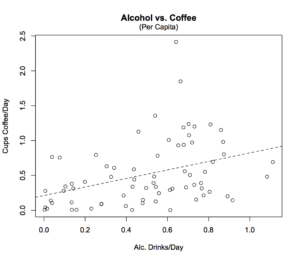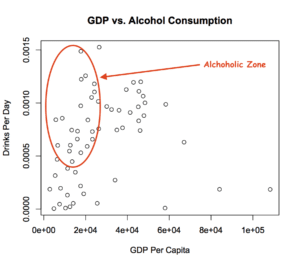After finishing my last blog post, I grew curious about the relationship between coffee and another beverage I’ve noticed is quite popular amongst backpacker folk: alcohol. Are late-night ragers (and their accompanying brutal hangovers) associated with greater levels of coffee consumption? Or is the idea about as dumb as another Hangover sequel?
When you look at a simple scatter plot associating per capita alcohol and coffee consumption on a national level, you might think that yes, alcohol does fuel coffee consumption (based on the apparent positive correlation).

But does this apparent relationship hold up to closer scrutiny? In my last article, we discovered that variables like country wealth could explain away much of the observed variation in coffee consumption. Could the same thing be happening here as well? That is, do richer countries generally consume more coffee and alcohol just because they can afford to do so?


The answer seems to be: not as much as I would have thought. The thing to notice in the graphs above is how much less sensitive alcohol consumption is to income compared to coffee. In other words, it don’t matter how much money is in your wallet, you gonna get your alcohol on no matter what. But for coffee, things are different. This is evident from the shapes of the data clouds in the respective graphs. That bunch of data points in the top left of the alcohol graph? You don’t see a similar shape in the coffee chart. And that means that consumption of alcohol depends much less on income, relative to coffee.
It’s not too surprising that alcohol consumption is less sensitive to income changes than coffee, but it’s always cool to see intuition borne out in real-life data that you randomly pull of the internet. By looking at what economists call income elasticity of demand—the % change in consumption of a good divided by the % change in income—we can more thoroughly quantify what we’re seeing. Using a log-log model, standard linear regression can be used to get a rough estimate* of the income elasticity of demand. In these models, the beta coefficient on log(income) ends up being the elasticity estimate.
When the elasticity of a good is less than 1, it is considered an inelastic good, i.e. a good that is not very sensitive to changes in income. Inelastic goods are also sometimes referred to as necessity goods. By contrast, goods with elasticity greater than 1 are considered elastic goods, or luxury goods. Sure enough, when you fit a log-log model to the data, the estimated elasticity for coffee is greater than 1 (1.08), while the estimated elasticity for alcohol is less than 1 (0.54). Hmm, so in the end, alcohol is more of a ‘necessity’ than coffee. Perhaps this settles any debate over which beverage is more addictive.
When it comes to drinking however (either coffee or alcohol), one cannot ignore the role that culture plays in driving the consumption of both beverages. Perhaps cultures that drink a lot of one drink a lot of the other, too. Or perhaps a culture has a taboo against alcohol, like we find in predominantly Muslim countries. To control for this, I included region-of-the-world controls in my final model relating alcohol and coffee consumption.
Unfortunately for my initial hypothesis, once you account for culture, any statistically significant relationship between alcohol and coffee consumption vanishes. To be sure that controlling for culture in my model was the right call, I performed a nested model analysis—a statistical method that basically helps make sure you’re not over-complicating things. The nested model analysis concluded that yes, culture does add value to the overall model, so I can’t just ignore it.
Echoing my last article, this is not the final word on the subject, as again, more granular data (at the individual level) could show a significant link between the two. Instead what this analysis says is that if a relationship does exist, it is not potent enough to show up in data at the national level. Oh well, it was worth a shot. Whether or not alcohol and coffee consumption are legit linked to one another, one fact remains indisputably true: hangovers suck.

Data Links:
- Alcohol – World Health Organization – link
- Economic Data – Conference Board – link
- Coffee – Euromonitor (via The Atlantic) – link
* “rough” because ideally, you would look at changes in income in a single country to estimate elasticity rather than look at differences in income across different countries.

